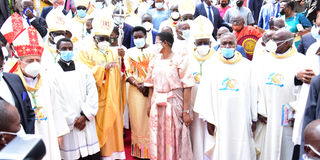Such sound cooperation of church and state

Vice President Jessica Alupo, Deputy Speaker Anita Among stand next to Kampala Archbishop Paul Ssemogerere on the day of his enthronement last month.
What you need to know:
Cooperation between Church and state can be traced in the Old Testament, writes Msgr John Wynand Katende.
I congratulate His Grace, Archbishop Paul Ssemogerere, upon his elevation to the Metropolitan See of the Archdiocese of Kampala. I, in the same vein, wish to underscore the prophetic message that God revealed to us during the first two days of the prelates’ ministry.
On the day of installation, presided over the Papal Nuncio, quite a sizeable number government officials attended, led by the Vice President of the Republic of Uganda, Her Excellency, Jesca Alupo. She presented the gift of a car offered by the State to the Archbishop. Through, the deputy speaker of Parliament, Rt Hon Anita Among, members of parliament made financial contribution towards the success of the function. The following day, the Archbishop graced the celebrations of the 36th anniversary of the National Resistance Movement regime, by leading the opening prayer.
Later in the day, His Grace was received at a private congratulatory cum thanksgiving function, hosted by Hon Kasule Lumumba and her family. In this sequence of events, we can discern a commendable partnership between Church and State.
The foundation for such co-operation must be a friendly relationship between the Church and the state, based on mutual respect. The Church, in paragraphs 74-76 of Vatican Council II document, “Joy and Hope”, states that there are close links between earthly things and those elements of man’s condition which transcend the world. The political community and public authority are founded on human nature and hence, belong to the order designed by God, even though the choice of a political regime and the appointment of rulers are left to the free will of citizens. (Acts 4:12).
The Church, for her part, is founded on the love of the Redeemer, to be a sign and a safeguard of the transcendent character of the human person. She contributes toward the reign of justice and charity within the borders of a nation and between nations. By reason of her role and competence, the Church is not identified in any way with the political community nor bound to any political system. This enables her to exercise her freedom to teach her whole doctrine and pass moral judgement on political issues, when the fundamental rights of a person or the salvation of souls require it.
Although the Church and the State, are, in their own fields, autonomous and independent from each other, both are devoted to the personal and social vocation of the same person. The more that both foster sounder cooperation between themselves, with due consideration for the circumstances of time and place, the more effective will their service be exercised for the good of all.
The Church accepts donations by the State, because she is expected to makes use of temporal things insofar as her own mission requires it. She, for her part, does not place her trust in the privileges offered by civil authority.
Cooperation between Church and state can be traced in the Old Testament. Prophets often acted as the finger of God challenging the state leaders. Despite his flaws, David is recognised as the ideal king of Israel, because he let God reign over his life and monarchy, through prophet Nathan (2 Samuel 1-24). The Church continues to play that prophetic role (2 Timothy 4:2).
On the Ugandan scene, Archbishop Dr Joseph Kiwanuka Nakabaale (1899-1966) was very active participant in the public affairs. In the early 1950s a major political crisis led to the exiling of the King of Buganda by the British colonial governor. The crisis was settled by the Namirembe Conference, in which Bishop Kiwanuka participated. During the governmental crisis of president Milton Obote, in 1965, he issued a pastoral letter on political leadership and democratic maturity. In 1985, the late Emmanuel Cardinal Nsubuga, with permission of the pope, participated in the Nairobi based peace talks between the NRM and Tito Okello Lutwa government.
The Church exhorts Christians, as citizens of two cities, to strive to discharge their earthly duties conscientiously and in response to the Gospel spirit. She must, therefore, give political formation to the laity, especially young people.





